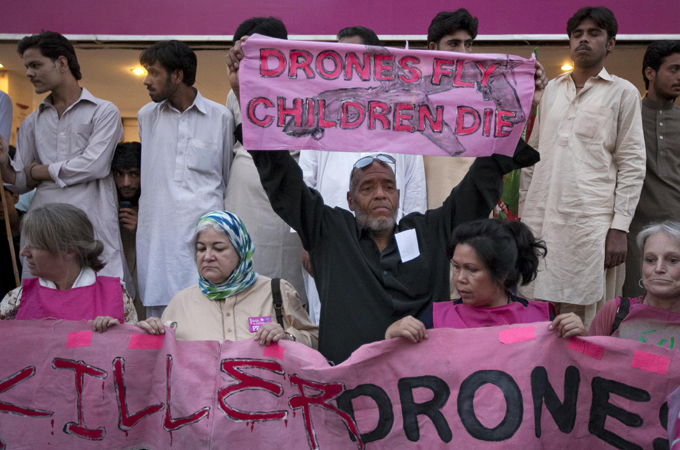UKPakistani
Chief Minister (5k+ posts)
[h=1]Power of Pink: women hungry for drone protest[/h]
 Code Pink protestors with several drone strike survivors from North Waziristan. Photo: Facebook
Code Pink protestors with several drone strike survivors from North Waziristan. Photo: Facebook
ISLAMABAD: Not content with a planned march into one of Pakistan's most dangerous regions, a group of middle-aged American women are considering mounting a hunger strike outside the US embassy in Islamabad as part a campaign against CIA drone attacks in the country.
Thirty-five activists from Code Pink, a US anti-war group, have gathered in the Pakistani capital this week as they prepare for an unprecedented march and political rally in South Waziristan, one of the semi-autonomous tribal areas on the Afghan border, which is a hotbed of Taliban militancy.
Local authorities have expressed strong doubts about the safety of the march, even though the Pakistani military has long claimed its operations in the area have brought a semblance of security.
Medea Benjamin, the veteran activist leading the Code Pink delegation, said: ''Frankly, it's a win-win situation for us, whether we get into Waziristan or not.
Advertisement
''We are going because we are challenging the Pakistani government to allow us to go to a place that has been off-limits but needs to be seen. And if they try to stop us, it will be clear they do not want the world to see what is going on there.''
On Tuesday in Islamabad, the women met retired generals, ambassadors and even a former head of the notorious Inter-Services Intelligence (ISI) military spy agency, and discussed other tactics to publicise their cause.
On Wednesday, the women met people from North Waziristan who said they were victims of the US drone campaign, having lost relatives to missile strikes by the remote-controlled planes.
The group includes Mary Ann Wright, a former US diplomat and army colonel who condemned her country's covert drone campaign as Barack Obama's ''personal execution device'', in reference to the US President's weekly meeting at which he is reported to choose targets for strikes.
The march, led by Imran Khan and his Pakistan Tehreek-e-Insaf party, is due to take place this weekend. Organisers hope to spend tonight in a town outside the tribal areas and then move on to Jandola, just inside the border of South Waziristan, where they will hold a rally.
The Taliban have given mixed signals over the march. In August, a spokesman said Mr Khan would be targeted because he is a ''liberal'', but other reports have said the Taliban will support the march.
Supporters say Mr Khan has been assured by the head of Pakistan's military, General Ashfaq Kayani, that if they go to South Waziristan they will remain safe.
If successful, the march will cement Mr Khan's position as a pre-eminent opponent of the US drone campaign.
Code Pink, which originally formed to oppose the second Iraq war, claimed its anti-drone campaign was still in its infancy.
''When it comes to drones, we are at the very beginning of turning public opinion against them in the US,'' Ms Benjamin said.

ISLAMABAD: Not content with a planned march into one of Pakistan's most dangerous regions, a group of middle-aged American women are considering mounting a hunger strike outside the US embassy in Islamabad as part a campaign against CIA drone attacks in the country.
Thirty-five activists from Code Pink, a US anti-war group, have gathered in the Pakistani capital this week as they prepare for an unprecedented march and political rally in South Waziristan, one of the semi-autonomous tribal areas on the Afghan border, which is a hotbed of Taliban militancy.
Local authorities have expressed strong doubts about the safety of the march, even though the Pakistani military has long claimed its operations in the area have brought a semblance of security.
Medea Benjamin, the veteran activist leading the Code Pink delegation, said: ''Frankly, it's a win-win situation for us, whether we get into Waziristan or not.
Advertisement
''We are going because we are challenging the Pakistani government to allow us to go to a place that has been off-limits but needs to be seen. And if they try to stop us, it will be clear they do not want the world to see what is going on there.''
On Tuesday in Islamabad, the women met retired generals, ambassadors and even a former head of the notorious Inter-Services Intelligence (ISI) military spy agency, and discussed other tactics to publicise their cause.
On Wednesday, the women met people from North Waziristan who said they were victims of the US drone campaign, having lost relatives to missile strikes by the remote-controlled planes.
The group includes Mary Ann Wright, a former US diplomat and army colonel who condemned her country's covert drone campaign as Barack Obama's ''personal execution device'', in reference to the US President's weekly meeting at which he is reported to choose targets for strikes.
The march, led by Imran Khan and his Pakistan Tehreek-e-Insaf party, is due to take place this weekend. Organisers hope to spend tonight in a town outside the tribal areas and then move on to Jandola, just inside the border of South Waziristan, where they will hold a rally.
The Taliban have given mixed signals over the march. In August, a spokesman said Mr Khan would be targeted because he is a ''liberal'', but other reports have said the Taliban will support the march.
Supporters say Mr Khan has been assured by the head of Pakistan's military, General Ashfaq Kayani, that if they go to South Waziristan they will remain safe.
If successful, the march will cement Mr Khan's position as a pre-eminent opponent of the US drone campaign.
Code Pink, which originally formed to oppose the second Iraq war, claimed its anti-drone campaign was still in its infancy.
''When it comes to drones, we are at the very beginning of turning public opinion against them in the US,'' Ms Benjamin said.





























